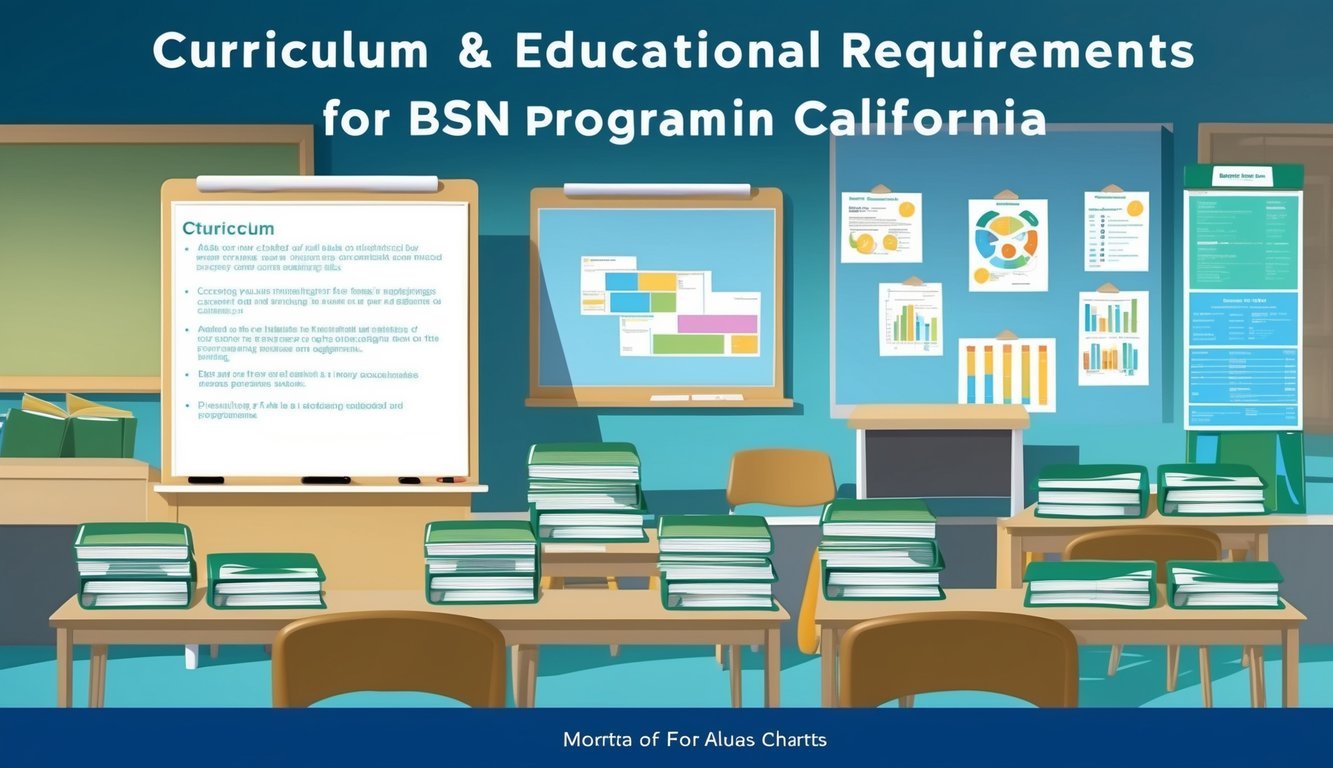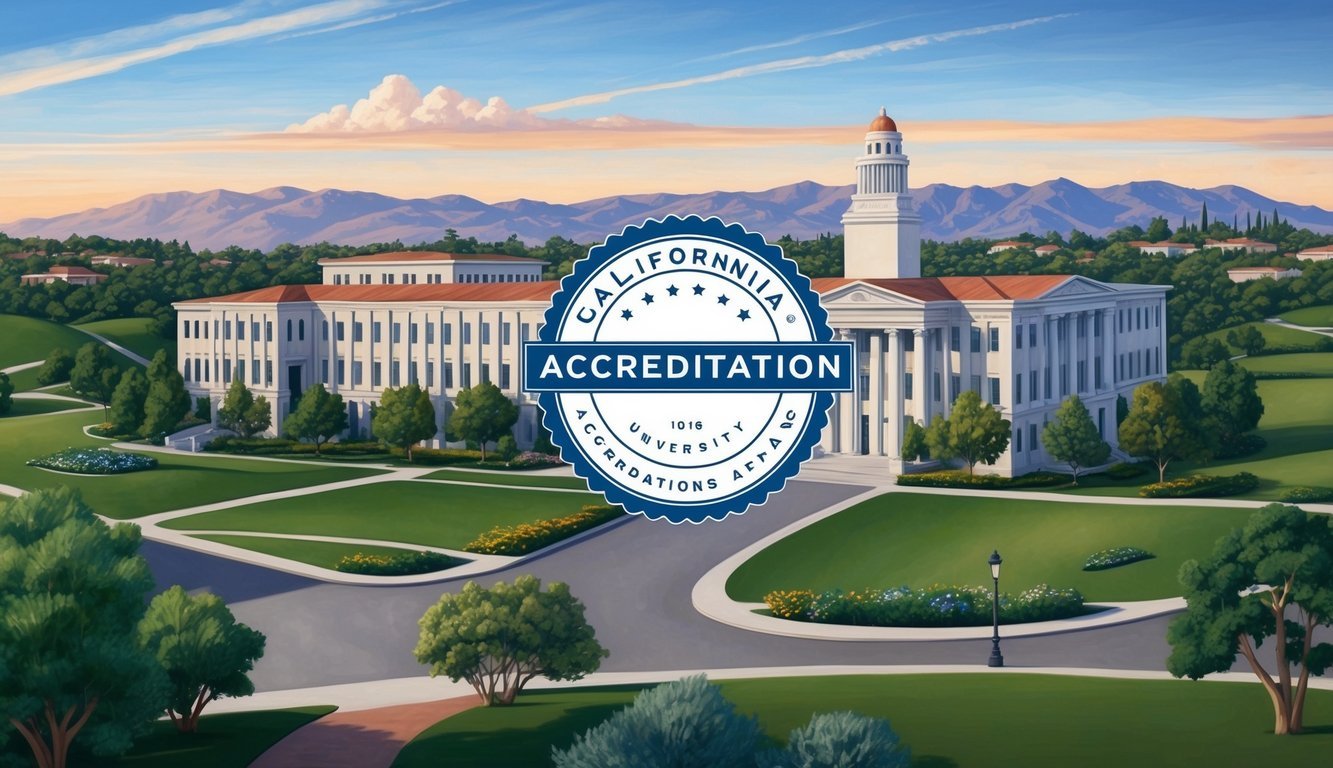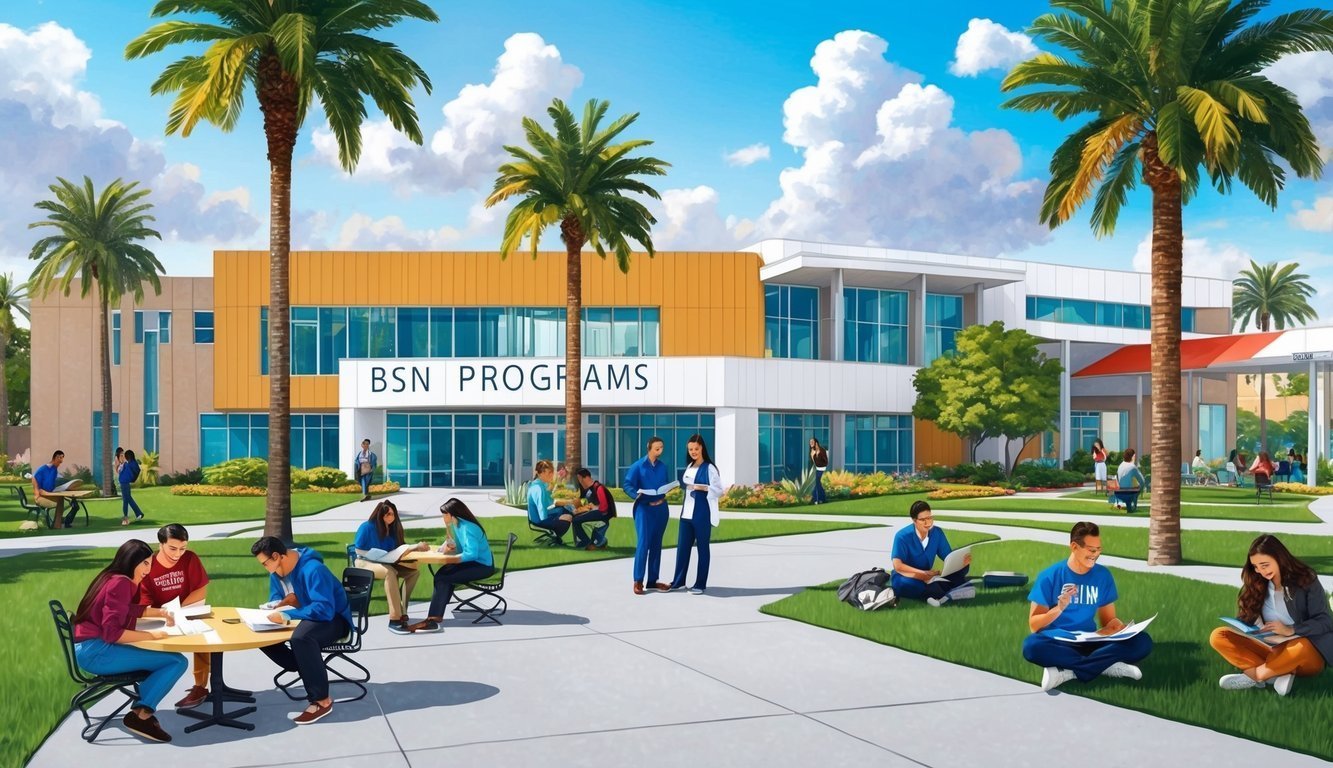The nursing profession offers a rewarding career, especially in California where the demand for registered nurses is high. Pursuing a Bachelor of Science in Nursing (BSN) degree can open doors to better job opportunities, higher salaries, and a diverse range of specializations. With several accredited BSN programs available, you can choose a path that best fits your needs and goals.
California’s nursing programs emphasize a combination of classroom learning and practical experience.
You will learn essential skills and knowledge necessary for successful patient care.
This degree is often preferred by employers and can position you for leadership roles in the healthcare field.
As you explore these programs, remember that you are investing in a future that not only benefits you but also the communities you will serve.
Whether you are an aspiring nurse or looking to advance your career, understanding the different BSN programs in California is crucial to making an informed choice.
Key Takeaways
- BSN programs in California prepare you for a rewarding nursing career.
- You can gain valuable skills through a mix of coursework and hands-on experience.
- A BSN degree enhances your job prospects and advancement opportunities in healthcare.
Overview of BSN Programs in California
California offers a range of Bachelor of Science in Nursing (BSN) programs to meet the growing demand for nurses.
These programs generally take four years to complete and prepare you for various nursing roles.
Key Nursing Schools
Here are some prominent nursing schools in California that offer BSN programs:
| University | Description |
|---|---|
| California State University | Offers robust BSN programs across multiple campuses. |
| San Diego State University | Known for its hands-on training and comprehensive curriculum. |
| University of California, Los Angeles | Provides a strong emphasis on research and community health. |
| University of San Francisco | Focuses on holistic nursing practices and diverse populations. |
Accreditation and Regulation
The California Board of Registered Nursing oversees the approval and accreditation of nursing programs in the state.
A program must meet specific standards to ensure quality education for future nurses.
Curriculum and Learning
BSN programs include clinical rotations, classroom learning, and lab work.
You will study subjects like:
- Nursing Fundamentals
- Anatomy and Physiology
- Pharmacology
- Nursing Ethics
These programs aim to equip you with the skills needed for various nursing environments, including hospitals and community health settings.
Nursing education in California is highly valued, not only for its rigorous standards but also for the supportive networks available for aspiring nurses.
Pathways to a BSN Degree
There are several pathways to earn a Bachelor of Science in Nursing (BSN) degree, each designed to meet different needs and circumstances of nursing students.
Traditional BSN
The Traditional BSN program is typically a four-year track designed for those entering nursing for the first time.
You start with general education courses, followed by nursing major classes.
Admission Requirements often include high school GPA, standardized test scores, and prerequisite courses in subjects like biology and chemistry.
Upon acceptance, you’ll engage in both classroom learning and hands-on clinical experiences.
Schools like CSU Long Beach boast impressive NCLEX pass rates, indicating strong preparation for nursing practice.
ADN to BSN
If you already have an Associate Degree in Nursing (ADN), the ADN to BSN pathway allows you to build upon your knowledge.
This program typically takes about 18 to 24 months to complete.
You will focus on advanced nursing concepts that expand your clinical skills.
General education requirements that may have been missed in your ADN program will also be addressed.
Programs often cater to working nurses by offering flexible scheduling.
Institutions such as California State University, Bakersfield provide options for students in this category.
Accelerated BSN Programs
Accelerated BSN programs are ideal for individuals who already hold a bachelor’s degree in a non-nursing field and wish to transition into nursing.
These intensive programs typically last 12 to 18 months.
You will cover the nursing curriculum in a shorter time frame, making it a fast track to becoming a nurse.
Admission requirements usually include a minimum GPA, completed science courses, and sometimes an entrance exam.
This type of program combines lectures, clinicals, and labs, allowing you to gain practical experience rapidly.
Many universities in California offer these programs to meet growing demand in the healthcare field.
RN to BSN Programs
RN to BSN programs are tailored for licensed registered nurses looking to further their education and enhance their careers.
These programs recognize your existing nursing knowledge and experience.
The curriculum usually includes advanced nursing practice, leadership, and public health education.
Programs can often be completed online, providing flexibility for working professionals.
Admission requirements include a valid RN license and an ADN or diploma in nursing.
Schools such as Cal State University Fullerton offer streamlined pathways for you to reach your BSN efficiently.
Curriculum and Educational Requirements

Understanding the curriculum and educational requirements for BSN programs in California is crucial for your nursing career.
These programs combine theoretical knowledge with practical skills, ensuring you are well-prepared for the nursing profession.
Clinical Training Elements
Clinical training is a key component of your BSN education.
It involves hands-on experiences in various healthcare settings, such as hospitals and clinics.
Programs typically include:
- Simulation Labs: Practice nursing skills in a controlled environment.
- Direct Patient Care: Work under supervision to gain real-life experience.
- Diverse Settings: Experience in different areas like pediatrics, geriatrics, and emergency care.
These elements are designed to enhance your nursing skills and prepare you for the challenges of patient care.
Programs accredited by organizations like ACEN and CCNE ensure that your clinical training meets high standards.
General Education and Core Nursing Courses
Your BSN program will include general education requirements along with core nursing courses.
General education may cover subjects such as:
- Psychology: Understanding patient behavior.
- Sociology: Learning about community health issues.
- Statistics: Applying data to health care.
Core nursing courses involve subjects like:
- Nursing Fundamentals: Basic nursing principles and practices.
- Pharmacology: Understanding medications and their effects.
- Mental Health Nursing: Focusing on psychological aspects of care.
These courses provide a well-rounded foundation crucial for effective nursing practice.
NCLEX-RN Preparation
Preparation for the NCLEX-RN exam is a pivotal aspect of your BSN education.
Many programs incorporate NCLEX-RN review into their curricula to ensure you are ready for this licensing exam.
Key preparation strategies include:
- Practice Tests: Simulate exam conditions to gauge your readiness.
- Study Groups: Collaborate with peers to strengthen knowledge.
- Tutoring: Additional support if you’re struggling with specific subjects.
Successfully passing the NCLEX-RN is essential to become a licensed registered nurse.
Your program’s focus on exam preparation will significantly impact your confidence and success on test day.
Licensing and Accreditation

Understanding the requirements for licensing and accreditation is essential for pursuing a Bachelor of Science in Nursing (BSN) in California.
It ensures that you are qualified to practice and that your education meets industry standards.
State Licensure by California Board of Registered Nursing
To become a licensed registered nurse (RN) in California, you must complete an approved nursing program.
Once you graduate, you need to pass the NCLEX-RN exam.
This exam tests your knowledge and skills required for safe nursing practice.
The California Board of Registered Nursing (BRN) oversees the licensing process.
You can find a list of approved programs on their website.
To maintain your license, you must complete continuing education and renew your license periodically.
Accreditation Bodies
Accreditation is crucial for nursing programs as it affects your eligibility for federal financial aid and job opportunities.
Two main accrediting bodies for nursing programs are:
| Accrediting Body | Focus |
|---|---|
| ACEN | Nursing programs at all levels |
| CCNE | Baccalaureate and graduate programs |
Programs accredited by these bodies ensure you receive a quality education.
The completion of an accredited program not only prepares you for the NCLEX-RN exam but also enhances your resume, making you more competitive in the job market.
You can explore various accredited programs through resources like NursingProcess.org.
Career Opportunities and Advancements

Pursuing a BSN in California opens up various career paths for nursing professionals.
You can explore numerous specializations, advance your education, and take on leadership roles.
These opportunities enhance your skills and position you for growth in the healthcare field.
Nursing Specializations
With a BSN, you can specialize in areas that cater to your interests and career goals.
Some popular nursing specializations include:
- Community Health Nursing: Focuses on health promotion and disease prevention in community settings.
- Public Health Nursing: Offers a broader view of health issues at the population level, often requiring a Public Health Nursing Certificate.
- Emergency Nursing: Prepares you for high-pressure situations in emergency rooms.
These specializations not only enhance your expertise but also make you more marketable in the job market.
You can also pursue additional certifications to further increase your career prospects.
Graduate Education in Nursing
Advancing your education is crucial for career growth.
Many RNs choose to pursue a Master of Science in Nursing (MSN) for more advanced roles.
An MSN can lead to positions like:
- Nurse Practitioner (NP): Provides direct patient care and can specialize further.
- Clinical Nurse Specialist (CNS): Focuses on improving patient care practices within specific populations.
Furthermore, some programs offer an RN to BSN pathway, allowing you to continue your education seamlessly.
This is beneficial for those looking to enhance their credentials and expand their career options.
Leadership Roles in Nursing
As you gain experience and pursue further education, you can attain leadership roles.
Leadership positions can include:
- Nurse Manager: Oversees clinical staff and ensures quality patient care.
- Nursing Educator: Teaches future nurses in academic settings.
Engaging in leadership development programs can help you strengthen skills needed for these roles.
Being a leader in nursing not only benefits your career but also positively impacts patient outcomes and team dynamics in healthcare settings.
Frequently Asked Questions
This section addresses common inquiries regarding BSN programs in California.
You will find information about enrollment requirements, top institutions, accelerated options, online programs, finding RN programs without waiting lists, and average salary expectations for BSN graduates.
What are the requirements for enrolling in BSN programs in California?
To enroll in a BSN program, you typically need to have a high school diploma or equivalent.
Most programs also require completion of certain prerequisite courses, such as biology, chemistry, and anatomy.
Some schools may require a minimum GPA and standardized test scores, such as the TEAS exam.
Always check specific program requirements for the institution you are interested in.
Which institutions offer the best BSN programs in California?
Several institutions are well-known for their BSN programs in California.
Some of the top schools include:
| Institution | Location |
|---|---|
| California State University, Long Beach | Long Beach |
| California State University, Fullerton | Fullerton |
| University of California, Los Angeles (UCLA) | Los Angeles |
| San Diego State University | San Diego |
These schools are recognized for their strong nursing programs and comprehensive training.
Are there any accelerated BSN programs available for prospective students in California?
Yes, there are accelerated BSN programs available for those who already hold a bachelor’s degree in another field.
These programs typically take 12 to 18 months to complete.
Institutions like the University of California, San Francisco, offer accelerated BSN options tailored for individuals looking to switch to a nursing career quickly.
What are some options for pursuing an online BSN program in California?
Many schools in California offer online BSN programs catering to working professionals.
You can find programs that allow for both online coursework and in-person clinical experiences.
For example, California State University, Bakersfield provides an RN-BSN online program designed for registered nurses looking to advance their education without disrupting their careers.
How does one find RN programs in California with no waiting list?
Finding RN programs without a waiting list can be challenging, but some schools do offer immediate admission.
Look for institutions that have a rolling admissions process or offer multiple start dates throughout the year.
Programs at some community colleges or private nursing schools may also have fewer restrictions and quicker enrollment options.
What is the average salary for a BSN graduate in California?
The average salary for a BSN graduate in California varies based on location and experience.
Generally, BSN holders earn between $70,000 and $100,000 annually.
In urban areas such as San Francisco or Los Angeles, salaries tend to be on the higher end due to the cost of living.
Networking and gaining experience through internships can also impact your earning potential.

